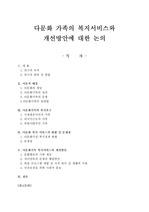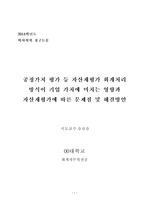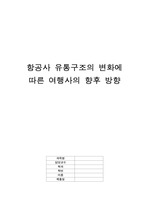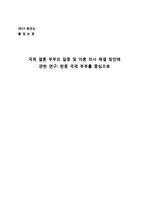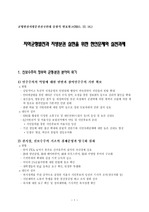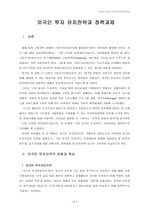

PARTNER
검증된 파트너 제휴사 자료
국적법상 국적선택제도의 문제점과 개선방안 (Problems and improvement measures of the nationality selection system under the Nationality Act)
32 페이지
최초등록일 2025.05.21
최종저작일
2025.03

-
미리보기
서지정보
· 발행기관 : 고려대학교 법학연구원
· 수록지 정보 : 고려법학 / 116호 / 77 ~ 108페이지
· 저자명 : 이연우
초록
국적법상 선천적 복수국적자는 만 22세가 되기 전까지 국적선택의 자유가 있으나, 남성의 경우 병역의무가 발생하는 18세가 되는 해의 3월 말까지만 국적이탈의 자유가 있다. 그러나, 국외출생·거주하는 복수국적자의 경우 이에 대한 이해 부족으로 제때 국적이탈 신고를 하지 못한 경우가 자주 발생하고, 이로 인해 거주국에서의 사회진출에 불이익을 받는다는 주장이 오랜 기간 제기되어 왔다.
결국, 2020년에 헌법재판소가 ‘국적법 제12조 제2항 본문 등이 국적이탈의 자유를 침해한다’고 하여 헌법불합치 결정을 함에 따라, 2022년 국적법 개정을 통해 생활의 근거가 외국에 있는 복수국적자를 위한 ‘국적이탈 특례제도’가 도입되었다. 하지만, 재외동포사회에서는 여전히 만족하지 못한 모습이다.
이에 국적법상 ‘국적선택제도’의 원리에 비추어 ‘국적이탈 특례제도’의 한계가 무엇인지 살펴보고, 나아가 ‘국적보유신고제도’의 개선을 통한 또 다른 차원의 문제 해결 방안을 모색해 보았다.
먼저, 국적법상 ‘국적선택제도’의 원리와 취지는 첫째 ‘국적자유의 원칙’에 따라 국적선택기간 동안 ‘국적선택의 자유’를 보장하고, 둘째 ‘단일국적주의’에 따라 국적선택기간 내에 ‘복수국적 상태를 정리’하려는 데 있다고 할 것이다.
따라서, 남성의 경우 병역의무로 인해 18세가 되는 해 3월 말까지만 국적이탈의 자유가 허용된다는 것은 ‘국적선택기간’이 그만큼 단축된 것이라고 할 것이므로. 그때까지 복수국적 상태도 정리되어야만 국적선택제도의 원리와 취지에 부합한다고 할 것이다.
하지만, 2022년에 도입된 ‘국적이탈 특례제도’는 그 단축된 ‘국적선택기간’ 내에 복수국적 상태가 정리되도록 제도가 개선되지 않고, 단지 국적이탈 신고를 제때 하지 못한 ‘정당한 사유’ 등을 입증하여야만 국적이탈 허가를 받을 수 있도록 하고 있어 국적선택제도의 원리나 취지에 부합하지 못한 한계가 있다고 할 것이다.
다음으로 우리 국적법상의 ‘국적보유(保有)신고제도’는 일본의 ‘국적유보(留保)신고제도’와 마찬가지로 우리 국적을 영구히 보유하게 하는 절차가 아니라 단지 일시적으로 유보하는 절차라는 점에서 제도의 명칭을 ‘국적유보(留保)신고’ 내지 ‘국적상실보류(保留)신고’로 하는 것이 더 적합하다고 할 것이다.
또한 국적보유신고제도는 복수국적자에 대하여 우리 국적을 조기에 상실시킴으로써 그 복수국적 상태를 정리하려는 제도라는 점에서 국적보유신고 대상으로 적합한 경우는 국내와의 유대가 희박한 복수국적자일 것이 요청된다. 따라서 국적보유신고 대상을 현행의 혼인·입양·인지·수반에 의해 외국 국적을 자동 취득한 사람에서 국외출생·거주하는 복수국적자로 변경할 필요가 있다고 할 것이다.
이와 같이 제도를 개선할 경우, 국외출생·거주하는 복수국적 남성이 국적이탈 신고를 제때 하지 못해 발생한 문제가 해결될 수 있음은 물론이고, 2010년 국적법 개정으로 도입된 ‘국적선택명령제도’로 인해 국내에 출생신고를 하지 않은 국외 거주 복수국적자의 경우 국적선택명령을 발할 수 없어 평생 우리 국적이 상실되지 않아 대를 이어 우리 국적이 계속 부여되는 문제의 해결에도 도움이 된다고 할 것이다.영어초록
According to the Nationality Act, people with multiple nationalities by birth have the freedom to choose their nationality until they turn 22, but men have the freedom to renounce their nationality only until the end of March of the year they turn 18, when military service obligation occurs. However, it has been argued for a long time that multiple nationalities born and residing abroad frequently fail to report nationality renouncement in time due to lack of understanding, and that this puts them at a disadvantage in advancing into society in their country of residence.
Ultimately, in 2020, the Constitutional Court ruled that the text of Article 12, Paragraph 2 of the Nationality Act was unconstitutional, stating that it “infringes on the freedom to renounce nationality.” As a result, the Nationality Act has been revised in 2022 to allow multiple citizens whose base of living is abroad. A ‘nationality renouncement special system’ was introduced for nationals. However, the overseas Korean community still appears unsatisfied.
Accordingly, in light of the principles of the ‘nationality selection system’ under the Nationality Act, we examined the limitations of the ‘nationality renouncement special system’ and further sought to solve the problem at another level by improving the ‘nationality retention reporting system’.
First, the principle and purpose of the ‘nationality selection system’ under the Nationality Act is, firstly, to guarantee ‘freedom of nationality selection’ during the nationality selection period in accordance with the ‘principle of freedom of nationality’, and secondly, in accordance with ‘single nationality principle’, to ensure ‘freedom of nationality selection’ within the nationality selection period. It can be said that it is aimed at ‘resolving the multiple nationality situation’.
Therefore, in the case of men, the freedom to renounce nationality is allowed only until the end of March of the year they turn 18 due to military service obligations, which means that the ‘nationality selection period’ is shortened accordingly. Therefore, it can be said that the principle and purpose of the nationality selection system are in line with the principle and purpose of the nationality selection system only if the multiple nationality status is resolved by then.
However, the ‘nationality renouncement special system’ does not improve the system so that multiple nationality statuses are resolved within the shortened ‘nationality selection period’, and permission for renouncement of nationality is only granted by proving ‘justifiable reasons’ for not reporting nationality renouncement on time. It can be said that there are limitations in that it does not comply with the principle or purpose of the nationality selection system.
Next, the ‘Nationality Retention Reporting System’ under our Nationality Act, like Japan's ‘Nationality Reservation Reporting System’, temporarily suspends the loss of Korean nationality, ultimately eliminating early Korean nationality for people with multiple nationalities, thereby resolving their multiple nationality status.
Considering the characteristics of this system, it would be more appropriate to report on retention of nationality or report on suspension of loss of nationality rather than report on retention of nationality. In addition, those eligible to report nationality are required to be multiple nationalities with minimal ties to the country. Therefore, there is a need to change the subjects of nationality reporting from those who automatically acquired foreign nationality through marriage, adoption, acknowledgment, or concurrence to those with multiple nationalities who were born or reside abroad.
If the system is improved in this way, not only can the problem arising from the failure of men with multiple nationalities born or residing abroad to report their nationality renouncement in time be resolved, but also help solve the problem of multiple nationalities living abroad who have not registered their birth in Korea due to the “Nationality Selection Order System” introduced by the revision of the Nationality Act in 2010, multiple nationalities living abroad who have not registered their birth in Korea cannot issue a nationality selection order, which can be said to be helpful in solving the problem of Korean nationality continuing to be granted from generation to generation.참고자료
· 없음태그
-
자주묻는질문의 답변을 확인해 주세요

꼭 알아주세요
-
자료의 정보 및 내용의 진실성에 대하여 해피캠퍼스는 보증하지 않으며, 해당 정보 및 게시물 저작권과 기타 법적 책임은 자료 등록자에게 있습니다.
자료 및 게시물 내용의 불법적 이용, 무단 전재∙배포는 금지되어 있습니다.
저작권침해, 명예훼손 등 분쟁 요소 발견 시 고객센터의 저작권침해 신고센터를 이용해 주시기 바랍니다. -
해피캠퍼스는 구매자와 판매자 모두가 만족하는 서비스가 되도록 노력하고 있으며, 아래의 4가지 자료환불 조건을 꼭 확인해주시기 바랍니다.
파일오류 중복자료 저작권 없음 설명과 실제 내용 불일치 파일의 다운로드가 제대로 되지 않거나 파일형식에 맞는 프로그램으로 정상 작동하지 않는 경우 다른 자료와 70% 이상 내용이 일치하는 경우 (중복임을 확인할 수 있는 근거 필요함) 인터넷의 다른 사이트, 연구기관, 학교, 서적 등의 자료를 도용한 경우 자료의 설명과 실제 자료의 내용이 일치하지 않는 경우
“고려법학”의 다른 논문도 확인해 보세요!
-
화물자동차 허가 총량제 입법과 정책의 취지 유지방안 및 이를 둘러싼 문제상황 - 입법론과 민사소송법적 쟁점을 중심으로 - 34 페이지
장치산업으로서의 특징을 갖는 택배업에 필수적인 화물자동차의 신규허가가 오랜 기간 동안 법령과 제도에 의해 엄격히 통제되어오고 있음에도 불구하고, 화물자동차 운수사업법의 입법형식의 공백으로 인하여 수급균형이라는 엄격 통제의 목적과 취지가 형해화되거나 몰각될 수 있는바, 이러한 법령상의 구조적 문제를 해결하기 위하여 화물자동차 운수사업법상 화물자동차 운송사업의.. -
재판지연에 대한 국가책임에 관한 연구* - 기본법상 적절한 기간 내에 재판을 받을 권리의 보장을 위한 독일 입법례와 그에 대한.. 40 페이지
유럽인권재판소는 재판지연이 발생할 경우 공정하고 신속한 재판을 받을 권리(유럽인권협약 제6조 제1항)와 효과적인 권리구제를 받을 권리(유럽인권협약 제13조)가 침해될 수 있다고 판시하며, 이를 방지하기 위해 개별 회원국이 실효적인 권리구제절차를 마련할 것을 요구하고 있다. 특히, 재판지연에 대한 권리구제절차의 실효성은 예방적 제재와 보상적 제재의 조합을 통..
찾으시던 자료가 아닌가요?
지금 보는 자료와 연관되어 있어요!
문서 초안을 생성해주는 EasyAI


